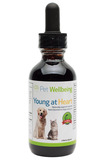
Although it sounds scary, if your beloved pet has a dog heart murmur it doesn’t necessarily mean that you need to panic!
In This Article You Will Read About
A lot of dogs suffer from heart murmurs and many go undiagnosed throughout their whole lives.
First, what is a heart murmur? Heart murmurs are audible sounds emanating either from the heart or the major blood vessels. Most of them are because of the turbulent blood flow. Less frequently dog heart murmurs are a result of cardiac structure vibrations (the heart valves). These structures produce a musical murmur with a single frequency.
This means that they don’t function normally, and usually have problems closing properly as blood is pumped through the heart chambers.
They are sometimes referred to as leaky valves. A hole in the heart (a small opening that connects chambers/arteries which are normally completely separated) can cause the same issue.
When this happens, it results in an abnormal heartbeat, which is heard as an irregular rhythm, and called a heart ‘murmur’.
Different things can cause this problem, including congenital defects (some breeds are more prone to this than others), heart disease, anemia, high blood pressure, damage from medication or toxins, old age, and more.
Murmurs can be present when a puppy is born or develop at any time during his life. Depending on what is causing them, they range from mild to severe and can be totally benign or very serious.
Dog Heart Murmur Grades
When it comes to severity dog heart murmurs are divided into different grades depending on their intensity. Their grades come from how loud the veterinarian can hear them.
The first one is Grade I being the least of concern, and Grade VI being the most dangerous.
- Grades I and II – there are often no other symptoms and your pet is likely to be watched rather than treated, at least at first. Might be seen in very young puppies, or those going through a rapid growth spurt; Grade I is only detectible in a very quiet room and Grade II is faint, easily audible, and restricted to a specific area of the chest.
- Grades III and IV – Grade III and IV murmur are immediately detectible with a stethoscope. Your puppy or dog may seem to tire easily, lose his appetite, or have a persistent cough. At this level, medication is often recommended and surgical options may be considered.
- Grade V and VI – The most serious grades are very loud and your vet will be able to feel the murmur through the skin. At this point, medication and surgery will most likely be needed, and canine congestive heart failure can develop.
Dog Heart Murmur Symptoms
The symptoms depend on many characteristics with the grade of the murmur being the most important one. Other characteristics are murmur location and configuration (plateau, crescendo-decrescendo, and decrescendo).
The most common symptoms include:
- Coughing
- Rapid breathing
- Exercise intolerance
- Congestion
- Weakness
- Fainting
- Blue or gray gums
- Abdominal distention (ascites)
- Lethargy
Help, My Puppy Has A Heart Murmur!
Before you get too upset, it’s important to realize that minor heart murmurs in puppies are not that unusual. Often they’re considered a congenital (hereditary) problem and may occur in around 1% of puppies overall.
Some breeds seem to have a higher incidence of cardiac birth defects which result in dog heart murmurs.
For example, Patent Ductus Arteriosus (PDA), a defect in the pulmonary artery, is more often seen in Poodles, Chihuahua, Maltese, Shetland Sheepdogs, and other herding breeds such as the German Shepherd and Collie-breed dogs.
Subvalvular Aortic Stenosis (SAS), a defect of the aortic valve, occurs more frequently in Boxers, Rottweilers, Golden Retrievers, Bernese Mountain Dogs, German Shorthaired Pointers, and several other large breeds.
Bulldogs, Schnauzers, Terriers, Beagles, and Samoyeds may be predisposed to suffering from Pulmonic Stenosis (another type of defect of the pulmonary valve).
Your veterinarian may notice heart murmurs during a regular check-up. Minor murmurs in puppies tend to earn a ‘wait and see’ type of approach if the pup seems otherwise happy and healthy.
This is because many pups outgrow them given time. Short episodes might also appear during particular growth spurts or developmental changes. Such murmurs are usually short-lived.
Symptoms of a dog heart murmur in puppies
- Poor weight gain,
- Slow growth
- Excessive sleepiness
- Lack of ‘puppy playfulness’
- Coughing, especially at night or first thing in the morning
- Pale gums/tongue
Heart Murmurs in Older Dogs
A dog heart murmur that develops later in life is usually a result of a disease or old age. It can sometimes be caused by something as simple as anemia. The most common reason for a dog to be anemic is that he/she has a parasitic infestation.
Worms such as whipworms or hookworms can make a dog anemic. And let’s not forget about heartworm that not only produces anemia but tends to provoke all sorts of other heart problems.
When it comes to more serious cases, heart valve disease is the most common culprit. The mitral valve is often affected and tends to deteriorate with age. It can lead to congestive heart failure and death.
Again some breeds are more prone than others to mitral valve disease and these include many toy and miniature breeds, especially Cavalier King Charles Spaniels.
This condition is considered degenerative (a condition related to aging), but occasionally it can be caused by an infection that affects the heart even though it may have started elsewhere in the body.
If you’re the owner of a senior dog I suggest checking out this page as it discusses heart problems in older dogs in some detail – Older Dog Heart Problems.
Diagnosing Heart Murmurs in Dogs
There are several ways that your vet can use to make a diagnosis of a heart murmur in your dog. Making a final diagnosis will include making more than one exam. All of the tests are in a specific order.
A Physical Exam
The first thing is to listen to the dog’s heartbeat with a stethoscope. This is how most heart murmurs are first noticed, particularly in puppies.
If you’re not familiar with the sound of a normal canine heartbeat it’s almost impossible to detect the murmur yourself, but the general description of a heart murmur is that it ‘softens’ the precise and regular sound of a normal heart.
The extra turbulence that occurs as the blood flows through the heart may cause a whooshing or hissing sound along with the normal ‘lub-dub’ heartbeat. Some murmurs have even been described as sounding like a washing machine (often indicates PDA).
If your vet notices that your pup/dog has pale or blue-tinged gums, this may also make him/her suspect heart problems.
Bloodwork, serum biochemistry, and urinalysis should be performed before proceeding to the following diagnostic tests.
Chest X-Rays
If your vet hears suspicious noises in your pet’s heart, he will likely take some chest x-rays as the next step in making a diagnosis.
Heart disease often alters the physical shape of the heart (causing certain areas to become enlarged) which is visible on an x-ray.
Also, any fluid that has collected in the lungs (as in Mitral Valve Disease) will be visible. X-rays are especially necessary to exclude other organs as the root of the symptoms.
EKG – Electrocardiogram
This test will show your dog’s heart rate and rhythm and can help detect blockages or other abnormalities that can be the cause of a dog’s heart murmur.
Echocardiogram
An echocardiogram is an ultrasound procedure and can give veterinarians a very clear picture of what is going on inside your dogs’ heart.
It shows the way each part of the heart contracts, the condition of individual heart valves and major blood vessels, and how thick the walls of the heart are.
A Doppler ultrasound is a specific type of device that uses high-frequency sound waves measuring the amount of blood flow. It is a good way for your vet to get an idea of how well your dogs’ heart is performing overall.
In serious heart murmurs caused by Sub Aortic Stenosis, Mitral Valve Disease, or Dilated Cardiomyopathy, the symptoms of the resulting canine congestive heart failure are similar.
Dog Heart Murmur Treatment
The first line of attack in terms of treating dog heart problems is usually to use medication (unless the canine heart murmur is severe enough to warrant immediate surgery).
There is a range of medications that your vet can prescribe, including ACE Inhibitors, Vasodilators, Diuretics, Beta Blockers, Digoxin, and various anti-arrhythmic drugs.
These all work the same way as they do in human heart patients, and are similar in terms of effectiveness.
Any of them can have side effects and your vet will monitor your dog closely if he takes them. In many cases, they can cause vomiting, diarrhea, or a loss of appetite.
If the medications don’t work, or the dog’s heart murmur is severe enough to require surgery, there are a couple of options.
It would seem that canine cardiac surgical procedures are more likely to be successful in puppies that have congenital heart problems than those that occur in older dogs.
There are two surgical options for repairing Patent Ductus Arteriosus in puppies, and the success rate is good. Performing the surgery as early as possible gives the pup the best chance of making a full recovery.
Subvalvular Aortic Stenosis is more difficult to repair surgically, although balloon valvuloplasty has been shown to help somewhat in up to 85% of cases. However, it has a fairly significant risk attached and between 5 and 10% of dogs may not survive the surgery.
Medications and lifestyle modifications are often the best way to control this condition.
A Pericardiectomy can be performed to drain fluid around the heart that may be putting pressure on it. This often occurs when a dog has a heart tumor.
Although a dog heart murmur is rarely a sign of cancer, unusual heart sounds, a rapid but weak heartbeat, and an enlarged chest can all be symptoms.
How To Keep Your Dog’s Heart Healthy & Strong
Unfortunately, you can’t do anything about preventing a congenital dog heart murmur if your pup already has one – but you can take steps to make sure his heart gets the best possible chance of staying healthy and strong.
Also, if you’re buying a puppy, especially if it’s from a breed known to have genetic cardiac conditions, choose a breeder who tests for them and never breeds a dog who has a heart problem.
Natural Supplements to Help Your Dog’s Heart
There are some great natural products that support a healthy heart and can even reduce or prevent certain degenerative conditions. ANY puppy or dog can benefit from these!
If you have a puppy or dog with a minor dog heart murmur, or one who is totally healthy (and you want him to stay that way!) there are natural herbal/natural products that you can use as a preventative measure.
They can help strengthen your dogs cardiac and circulatory systems, and improve his immune function. Here are a couple that are worth checking out Resvantage Canine for Dog and Young At Heart for Dog Heart Disease:

There are also natural supplements that include certain vitamins and minerals which can help many dogs with heart issues. They DO NOT replace mainstream medications or surgery but should be used alongside them.
Do remember to tell your vet about any product or supplement you give your dog though, just because something is ‘natural’ it doesn’t mean that it can’t (or won’t) interact with another medication or be inappropriate for your individual dogs’ condition.
Some natural supplements that are often recommended include Omega-3 Fish Oils, the amino acids Taurine and L-Carnitine and certain , and Vitamin/Mineral Supplements
Try these online stores for a wide selection of natural products and supplements that can help with a huge range of canine health problems (not just heart disease!)….
Covering the Cost of Dog Heart Murmur Treatment
Veterinary care can be expensive even for routine or minor procedures, when it comes to the major stuff… it can cause your bank account some serious damage!
Knowing that you have the necessary financial resources to take care of your Rottie if he develops a serious or chronic illness, has an accident, or needs surgery can give you much-needed peace of mind, and can even save you from having to make a life-or-death decision based on $$$’s.
Pet health insurance can be a lifesaver, and getting your pup covered while he’s young and healthy is the best possible scenario (you can get insurance for a dog of almost any age, but pre-existing conditions won’t be covered).
My Best Pet Health Insurance page will help you find the right cover for your Rottweiler (and other pets too!).
Dog Heart Murmur Life Expectancy
Since there are many causes for a dog heart murmur, the life expectancy for dogs with this condition cannot be defined.
Even severe cases with heart failure can be managed if treated properly and on time. If your dog has been diagnosed with certain disease-causing heart murmurs, ask your vet about the prognosis and treatment success rate.
Rottie owner? Get your Rottie featured on our site with a dedicated page
Simply fill out the form in the link with a picture and description and we’ll create a dedicated page on our site featuring your Rottie.

